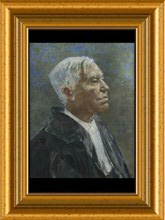Nieuw gebouw Faculteit Rechtsgeleerdheid vernoemd naar Bernard Röling

In de zomer van 2023 verhuist de Faculteit Rechtsgeleerdheid van de Rijksuniversiteit Groningen naar de Oude Boteringestraat 18. Het nieuwe gebouw krijgt de naam: Het Rölinggebouw, vernoemd naar prof. Bernard Röling. Röling was van 1949 tot zijn overlijden in 1985 hoogleraar strafrecht, strafvordering en criminologie aan de Faculteit Rechtsgeleerdheid van de Rijksuniversiteit Groningen.
Als hoogleraar richtte Röling in 1962 het Polemologisch Instituut in Groningen op, om oorzaken van oorlog en voorwaarden voor vrede te onderzoeken. Hij vervulde vanuit deze functie tot zijn dood in 1985 een centrale rol in de voortdurende (inter-)nationale discussie over vredes- en veiligheidsbeleid op zowel het wetenschappelijke als politieke vlak.
Bernard Röling werd geboren in 1906 in ’s-Hertogenbosch en promoveerde na zijn rechtenstudie in Nijmegen, Marburg en Utrecht in 1933 op het proefschrift ‘De wetgeving tegen de zogenaamde beroeps- en gewoontemisdadigers’. Het proefschrift werd door de Rijksuniversiteit van Groningen bekroond als antwoord op een door de RUG uitgeschreven prijsvraag.
Na zijn promotie werd Röling benoemd tot privaatdocent in de penologie (strafwetenschappen) en het penitentiair recht aan de universiteit van Utrecht. De eerste mijlpaal in de loopbaan van Röling was de oprichting van het Criminologisch Instituut te Utrecht, het eerste in Nederland.
Door zijn benoeming tot rechter in het oorlogstribunaal te Tokio in 1946 kwam hij in aanraking met het volkenrecht. Daarna werd hij lid van de Nederlandse delegatie bij de Verenigde Naties, waar hij zich heeft beziggehouden met internationale geschillen. Hij verwierf bekendheid in deze functie doordat zijn opvattingen regelmatig van die van de meerderheid afweken.
In 1949 werd Röling benoemd tot hoogleraar strafrecht, strafvordering en criminologie te Groningen. Als strafrechtgeleerde genoot hij groot gezag door zijn veelal uitnemende annotaties van strafvonnissen. Al snel kwam echter het zwaartepunt van zijn wetenschappelijke activiteiten te liggen in het internationaal oorlogsstrafrecht en in het oorlogsvraagstuk en het volkenrecht in het algemeen. In 1957 werd zijn leeropdracht daarom uitgebreid met het internationaal recht.
Meer nieuws
-
08 december 2025
Kleurrijke Kopstukken: Bert Röling
